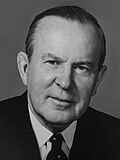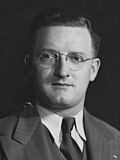Overview
On September 7, 1965, for the first time ever, the election writ was announced on live television across Canada by Prime Minister Lester Pearson. [2] The networks then broadcast responses to the election announcement from all four House of Commons opposition leaders. [2]
The Liberals campaigned on their record of having kept the promises made in the 1963 campaign, which included job creation, lowering income taxes, higher wages, higher family allowances and student loans. They promised to implement a national Medicare program by 1967, and the Canada Pension Plan system of public pensions. The party also urged voters to give them a majority for "five more years of prosperity". The party campaigned under the slogans, "Good Things Happen When a Government Cares About People", and, "For Continued Prosperity". However, the Liberals came up two seats short of a majority, largely due to being virtually nonexistent in the Prairies for the second consecutive election. They actually lost five seats in the region, the only survivor being Veterans Affairs Minister Roger Teillet.
The Progressive Conservative Party of John Diefenbaker, campaigning with the slogan, "Policies for People, Policies for Progress", gained a small number of seats. Despite losing a second time, Diefenbaker refused to resign as party leader, and was eventually forced from the position by a campaign by the party president Dalton Camp. Diefenbaker subsequently ran for re-election as leader in the party's 1967 leadership convention, but lost to Robert Stanfield.
Old age pensions were an important issue in this campaign. The Liberal Party pointed to having increased the pension to $75 per month for persons 70 years of age and older, planned to reduce the eligibility age to 65 by 1970 and also promised a "Canada Assistance Program" payment for seniors with lower incomes. The PCs promised to increase OAP to $100 per month for all those 70 years old and over.
The New Democratic Party of Tommy Douglas, campaigning under the slogan, "Fed up? Speak up! Vote for the New Democrats!", increased its share of the popular vote by more than four and a half percentage points, and became the third largest party in the House of Commons. However, it won only four more seats as it continued to fail to make the electoral break-through that was hoped for when the party was founded in 1960.
The Social Credit Party of Canada split in two before this election. Réal Caouette led French-Canadian Socreds out of the party into the new Ralliement créditiste (Social Credit Rally) but lost more than half of the party's Quebec seats. Robert N. Thompson continued to lead the Social Credit Party in English-speaking Canada, and actually managed to gain one seat outside Quebec although it was still fewer than the French-Canadian breakaway party. However, even the combined seat totals of the two factions would not have been enough to prevent the NDP from replacing Social Credit as the third largest party. The election would be the last time that the Social Credit Party elected federal candidates outside Quebec.
This was the first election for the Rhinoceros Party of Canada, a satirical party led by Cornelius the First. The party fielded only one candidate. Cornelius, a resident of the Granby zoo, did not seek election because Canadian election law does not permit rhinoceroses (or other zoo animals) to be nominated.
In order to govern, the minority Liberals relied on the New Democratic Party and occasionally other smaller opposition parties in order to remain in power. Pearson announced his intention to resign as Liberal leader in December 1967 and was replaced the following April by Pierre Trudeau. Having served just short of five years, Pearson is the longest-serving Canadian prime minister to have never led a majority government.
Notably, this election marked the last time that a single conservative party did not win an absolute majority of the vote in Alberta (although the totals of the Progressive Conservatives and Social Credit combined did add up to over two thirds of the vote in that province).








